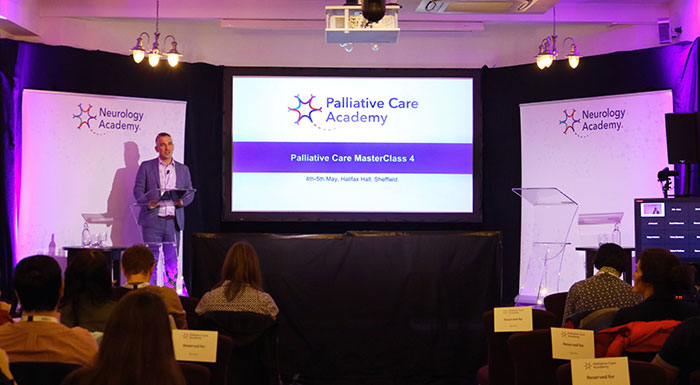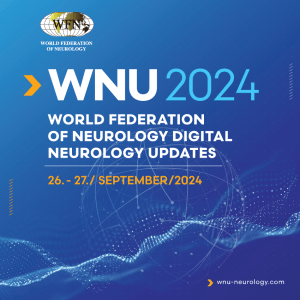Overview

From 4-5th May, a brand new style of course, supporting development of a dual skillset in neuro-palliative care took place in Sheffield. The Palliative Care MasterClass, spearheaded by Consultant Geriatrician Dr Ed Richfield and run by Neurology Academy, took a brand new format and approach to the previous three Academy courses on the same subject.
Sharing the expertise of 19 speakers over the two days, it was attended by 27 in-person and 24 virtual delegates spanning a range of roles and backgrounds, including consultants, nurses, physiotherapists, occupational therapists and speech and language therapists, and with specialisms in neurological conditions or specialist palliative care. Part of the course goal, beyond developing knowledge and skills in this area, was to develop a community of professionals interested in neuro-palliative care, so to ensure virtual delegates also enjoyed a good level of interaction, they were projected into the room, consulted during discussion periods, and engaged through virtual platforms.

The course was sectioned into palliative care principles across four core neurological conditions: dementia, Parkinson’s, multiple sclerosis (MS) and motor neurone disease (MND). Each condition section featured four experts in the field from different roles, and each speaker gave a thirty minute talk on their particular topic with 10-15 minutes for questions from, and discussion with, delegates at the end of each condition’s section. In between the two days were sessions on lived experience and service development.
Both days ended with a cross-condition, cross-discipline panel discussion where speakers from throughout the day came together to debate complex cases. This approach was both novel and well received, demonstrating the individuality of patient management and of professional response, and gave rise to a great deal of questions, comments and direct input into cases from delegates.
Dementia
The first condition section looked at was dementia, with occupational therapist Jenny Casson opening with non-pharmacological management of behavioural and psychological symptoms of dementia (BSPD), followed by Consultant Psychiatrist Dr David Okai discussing pharmacological management of the same. Dr Okai shared that, if a person is in psychological or psychiatric distress, it immediately adds a level of complexity to their management and has the greatest impact on their quality of life.
This was well supported by Dr Clare Ellis-Smith who spoke on identifying unmet needs, and Professor Karen Harrison-Dening of Dementia UK who presented on managing dementia in a hospice setting. Throughout all the presentations, the focus was on recognising each individual’s needs, identifying the root causes of their behaviour, and trying to meet their needs through empathy. The result was an overall collaborative and multidisciplinary presentation of holistic support and management of someone with dementia.
Parkinson’s
Dr Ed Richfield opened the course section on Parkinson’s by explaining the need to employ the principles of palliative care from the point of diagnosis and throughout a person’s journey, and closed the section with a thoroughly practical review of palliative assessments, when, how and what to assess, and where there is evidence of unmet needs in those with Parkinson’s.
Speech and language therapist Anna Tucker discussed managing dysphagia in Parkinson’s
and its impact, with a focus on eating and drinking with accepted risks – an in-demand topic which was returned to and discussed extensively in later panel discussions. Anna gave a very practical session highlighting the benefit of assessments such as fiberoptic endoscopic evaluation of swallowing (FEES) to monitor swallowing and initiate early discussions around preferences for eating and drinking, whilst highlighting how the goals and preferences of the individual will impact the pathway of care and interventions considered around dysphagia management. Practicalities continued with Advanced Clinical Pharmacist Viv Horton’s discussion of medicines management in people with Parkinson’s approaching the end of life. She reviewed how to decide when to de-escalate medications and the safest way to do so, alongside the individualised use of anticipatory medications to support people’s goals and wishes as they approach the end of life.
Panel discussion
At the end of day one, speakers Anna Tucker, Karen Harrison-Dening and Viv Horton were joined by Dr Jon Tomas, Consultant in Palliative Medicine, to discuss a series of complex cases exploring pain support for carers, communication difficulties and identifying a terminal phase in a given disease or condition. Each case was presented succinctly by Dr Ed Richfield, with an initial detailed response from one of the panel before other panelists shared their thoughts, and discussion was opened up to delegates for questions, comments and other possible approaches.
Day two began with a wider perspective on neuro-palliative care, considering service development challenges and opportunities in a post-pandemic NHS. Dr Ed Richfield suggested that a supportive structure is critical to delivering ‘primary care palliative care’, or palliative care in a non-specialist environment.
Dr Jon Tomas built on this, suggesting that a combination of data review and interpretation coupled with effective inter-disciplinary and inter-departmental relationships are crucial to moving services forward – but that this also needs cementing in agreed structure, so it is not reliant on one or two individuals and cannot be threatened if people change posts. Finally in this section of learning, healthcare consultant Sue Thomas discussed the opportunities presented by integrated care boards (ICBs) and some practical ideas for bringing service plans to their attention.
MS
The next section of the programme was dedicated to MS, with a common theme throughout the three presentations highlighting the challenges of meeting patient preferences where these are unclear or present ethical dilemmas, and the difficult decisions around contrasting someones’ quality of life in the moment with that of the coming months.
Palliative Care Consultant Dr David Oliver discussed unmet needs in MS contrasting two patients where gastrointestinal tube insertion increased quality of life for one, and decreased it for another, reviewing the differences in personal preferences and the impact this had. Dr Rachel Farrell presented a natural history of MS and shared two complex spasticity cases which again highlighted the importance of patient outcome preferences. Specialist Nurse Sarah Roderick then presented opportunities for palliative discussions across a patient’s journey with MS exploring the nuance and individual nature of these discussions through case study examples and highlighting the importance of professional collaboration at different points.
MND
The final neurological condition discussed on the course was MND where the key message was around the constant and evolving decision-making process for any individual, the right for that person to change their preferences at any point, and the need for supported decision-making around wishes through life and into dying.
Consultant Neurologist Alexander Thompson outlined the different forms of MND, the progression and trajectory associated with each and the individual nature of every person’s needs and choices. Specialist Nurse Rachael Marsden talked about managing respiratory difficulties and the use of invasive versus non-invasive ventilation. Dr Emma Husbands discussed the complexity of advance care planning, stating that this process is less about how we want to die, and more about how we want to live – of which dying is one part. Lastly, dietician Sean White discussed dietetic management in MND, the complexity of discussions around eating and drinking, the potential benefit of feeding tubes, and the importance of gradual discussions to achieve the best and most informed outcomes for people in the long-term.
Panel discussion
The final panels of the course were split into two 45 minute groups. Rachael Marsden and Drs David Oliver, Rachel Farrell and Alexander Thompson considered how to recognise someone approaching the end of life, and had a complex ethical discussion about when improving someone’s quality of life in the moment may mean they have reduced quality of life thereafter.
The second panel discussions, led by Dr Emma Husbands and Sarah Roderick, focused on the needs of people in a caring role amongst family and friends. One case unpicked the difficulties of supporting a patient and their family carer when their wishes and best interests are at odds with each other, whilst the other considered how to set boundaries whilst still meeting needs where someone is placing unreasonable demands on both formal and informal carers.
Summary
Each section of the packed course delivered valuable and specific information, yet there were strong themes which ran across both days and were expressed in all of the different condition-sections and panel discussions.
These were: the importance of holistic, individualised and person-centred care, the need for formal and informal professional collaboration, and clarity that palliative care is a value and a concept as well as a type or phase of care. By bringing these three ideas together, people living with a neurological condition can experience a good quality of life and clinical support to enhance that, from diagnosis all the way through to the end of life.

